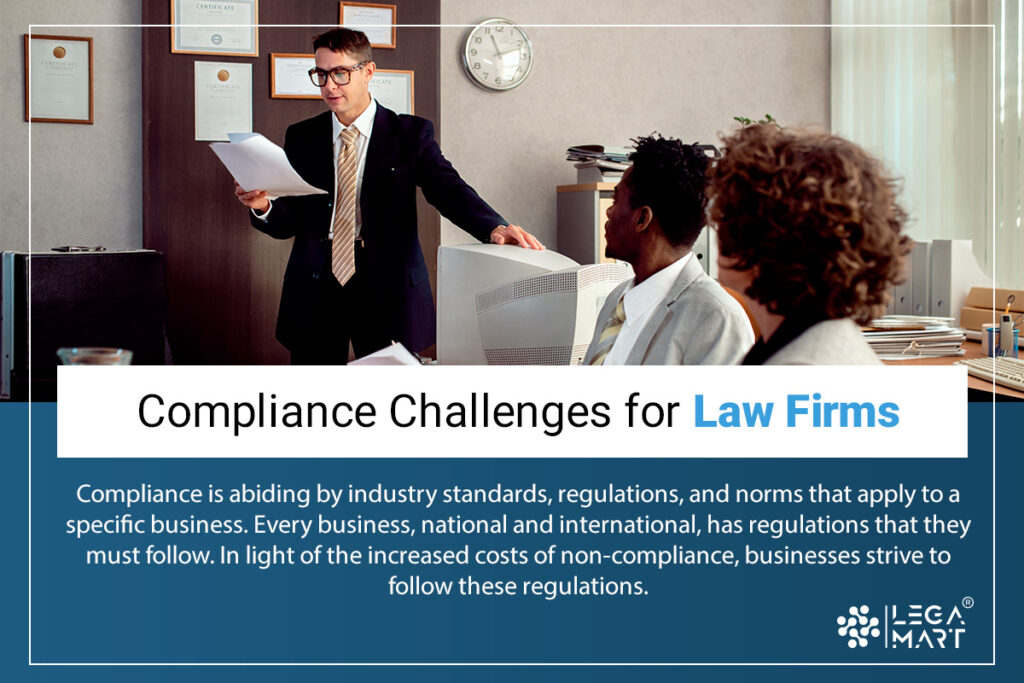Introduction
Compliance is abiding by industry standards, regulations, and norms that apply to a specific business. Every business, national and international, has regulations that they must follow. In light of the increased costs of non-compliance, businesses strive to follow these regulations.
Law firms are not left out. Given the peculiarity of the legal profession, compliance is of high priority. Law firms ought to be compliant with regulations governing specific areas of practice. Nevertheless, the regulatory compliance process of law firms can be challenging.
Why are law firms held to strict compliance standards? What are the compliance challenges for law firms? How can these challenges be overcome? Read along as this article seeks to discuss compliance challenges for law firms.
Why are Law Firms held to a Strict Compliance Standard?
The legal profession is a unique one, likewise the legal workplace. Lawyers and law firms are held to high standards as professional codes and conduct regulate the profession. Failure to bid the codes of conduct attracts legal consequences and even disbarment.
Law firms have access to and store a large amount of client data. Intellectual property and trade secrets are some sensitive client data that law firms have access to. This makes law firms a target for cyber-attacks and data breaches. Thus, a legal firm must adhere to local and international regulations on data privacy. These regulations are ever-evolving, and law firms must keep abreast of them.
Again, law firms facilitating financial transactions may face anti-money laundering (AML) risk. So, law firms must always comply with anti-money laundering regulations. Fines and reputational damage are some consequences law firms may suffer for non-compliance.
Compliance Challenges for Law Firms
Compliance with regulations is necessary for every business, company, and industry. Law firms are not immune from the need to be compliant with laws. Various regulations govern the legal profession and law firms. Yet, these legal firms do face significant compliance-related challenges. This segment will discuss some of the compliance challenges for law firms.
Limited Resources
Limited resources are one of the compliance challenges for law firms, especially small firms. Resources include human resources, training, IT systems, and monetary resources.
The challenge is that compliance regulations do not consider the law firm’s size. Compliance rules apply to all law firms, irrespective of their size. Larger law firms may have a compliance team that keeps up with the changing regulations. Yet, smaller law firms may not have resources or afford the cost of continuous compliance.
Training the entire staff may be the best thing to do when a legal firm lacks the resources to hire staff for compliance risk management.
Data Privacy and Breach Concerns
Cybercrime and attacks are increasing, and law firms are the primary attack targets. Law firms have access to and store a large amount of confidential client data. Unlike other businesses, law firms may be more likely to face data privacy risks because of the legal privilege and confidentiality they enjoy with their clients. A data breach or cyber-attack can be destructive, given the sensitive client data law firms hold.
In America, the Lawyers’ Obligation After an Electronic Breach or Cyberattack stipulates data security duties for law firms. The document outlines what a legal firm should do before and after a breach.
Also, The COVID-19 pandemic introduced a change in workplace conditions. It compelled diverse sectors to work from home. Many law firms have incorporated remote work into their work policy. Lawyers work from their homes with personal computers and networks. The decentralization of law firms’ computers has led to an increase in cybersecurity threats.
Thus, adhering to compliance rules for such a vast amount of data law firms hold can be expensive. It is more difficult when the data is in many locations or offices. Cybersecurity entails extensive investment in IT and cybersecurity staff. Again, small law firms may not afford the adequate protection needed.
Global Market

There is an increasing shift from a local to a global legal market. In recent times, Legal services are not restricted to jurisdiction. Some law firms operate across many jurisdictions and practice areas. More and more global lawyers are providing services beyond the jurisdiction in which they are trained and qualified.
Legal firms that operate in many jurisdictions face compliance issues. In many jurisdictions, a law firm operates under different regulations. Such law firms must invest in a compliance team. This will help lawyers to be aware of all compliance risks that apply to them.
Lack of Compliance Culture and Ethical Infrastructure
Policies and regulations are not enough to ensure compliance. The level of compliance is not solely determined by policies. Unless there is a strong ethical culture in a firm, it will be difficult to implement policies. Legal firms must have ethical culture and best practices to guarantee compliance.
It does not help that some law firm regulations like Solicitors Regulation Authority (SRA) guidance and the Legal Sector Affinity Group (LSAG) are often difficult to understand. Some may also be time-consuming and expensive to put in place. Lawyers may attempt to circumvent regulations if law firms have no strong culture.
A firm’s compliance culture should begin with senior members. This will provide direction and set expectations for other members to act by. With the right culture at the firm, lawyers will not attempt to work around or operate outside regulations.
How to Overcome Compliance Challenges for Law Firms?
Law firms can overcome compliance challenges for law firms through.
Diligence
Since Law firms are prone to AML risk, firms need to carry out customer due diligence (CDD) on clients. Ascertaining who clients are and their source of money cannot be overemphasized.
It is important to know who a client is and their source of money. Conducting CDD on clients can indeed be complex for law firms. This is so given the structured businesses and entities law firms work for. Yet CDD on clients can save law firms from money laundering and organized crime.
Leveraging on Technology
Law firms can take advantage of technology to ensure compliance with regulatory requirements. Investing in IT infrastructure will help law firms protect themselves from cybersecurity threats. A good IT staff is an asset to a law firm.
Also, legal firms can stay ahead of compliance using digital compliance management software. The compliance tool could be anti-money laundering guidelines for law firms. It may also be tools that allow for General Data Protection Regulation (GDPR) guidelines. Law firms can integrate relevant compliance-based data into a single view with cloud-based platforms.
Compliance management software can also increase workflow by automating compliance processes.
Outsourcing the Compliance Process
Another way to overcome compliance challenges for law firms is to outsource compliance functions. Outsourcing entails hiring third-party to handle compliance requirements. The complexity of law firm compliance requirements may need compliance professionals. To ensure compliance, law firms can transfer compliance duties to professionals. This way, they can rest assured that the compliance process is handled by skilled experts.
Outsourcing also reduces disruption in a firm’s compliance management, especially when key staff members leave the firm.
Education and Training

A lack of internal knowledge and understanding can result in non-compliance. Most law firms have gotten used to significant regulations. Yet compliance laws evolve. Staff needs to be aware of changes in the law to ensure compliance. Also, the shift in work dynamics due to COVID-19 created new risks. And Law firms must invest in staff training and education. They must see to updating staff knowledge on industry rules and regulations. This is particularly for smaller law firms that may not have the resources to hire compliance teams.
Conclusion
Compliance is an integral part of any business. It ensures that all operations adhere to laws and regulations. Like any other business, law firms ought to obey regulations in line with their practice area. However, the process of compliance by law firms can be complex. This is due to the uniqueness of the legal profession.
Compliance challenges for law firms include limited resources and Data privacy concerns. Law firms that operate globally may be prone to compliance issues. This is because the more the jurisdiction of operation, the more the compliance laws. Again, It is not enough to have policies; law firms must have the right culture that enables compliance.
Education, diligence, and leveraging technology can help a firm overcome compliance challenges. Outsourcing compliance functions to skilled experts is also a good way to overcome compliance challenges. Non-compliance to laws and regulations attracts repercussions. High fines, damage to reputation, and business relationships are some of the costs of non-compliance.
Do you have more questions about compliance challenges for law firms? LegaMart has got your back. Ask your questions on our community page, and be sure to get an answer right away.




